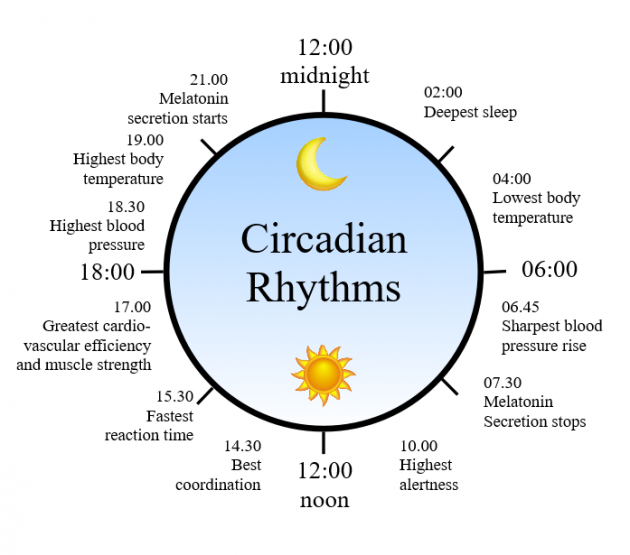The Rhythm of Your Meals - Your Guide to Chrononutrition
Have you ever considered that the timing of your meals might be just as important as the food you're eating? While we often focus on calories, carbs, and protein, our body's internal clock has its own schedule for handling nutrients.
This internal 24-hour clock, known as the circadian cycle, governs more than just your sleep-wake schedule. It also regulates your metabolism, hormone levels, and digestive system, dictating when your body is most efficient at digesting food, absorbing nutrients, and burning energy. When we eat at times that are out of sync with this natural rhythm, like snacking late at night, we can disrupt these crucial processes.
This article will explore the connection between your circadian cycle and your nutrition, introducing you to the concept of chrononutrition. You'll learn how to align your eating habits with your body's biological clock, providing you with a powerful new tool to improve your digestion, boost your energy, and support your overall health.
An Introduction to Chrononutrition
Chrononutrition is an emerging field of science that studies how the timing of our food intake affects our health. It is based on the idea that our metabolic processes, like all other physiological functions, are regulated by our body's circadian rhythm.
The core principle of chrononutrition is that it's not just what you eat and how much you eat, but also when you eat that is critical for health. The concept suggests that eating in alignment with your body's natural cycle can improve metabolic health, while eating at irregular times or late at night can disrupt these rhythms and lead to negative health outcomes.
By synchronizing your eating habits with your body's natural rhythms, chrononutrition aims to optimize digestion, improve metabolic function, and support overall health and well-being.
Timing is Everything - Your Metabolism Changes through the Day
The core principle is to eat when your body is most active and capable of processing food, and to fast when it is in a state of rest and repair.
Your digestive system, including the stomach and intestines, is most active and efficient during the day when you are awake. Processes like gut motility and the secretion of digestive hormones are at their peak. Eating during the day takes advantage of this heightened digestive capacity.
Your body is best at utilizing energy, particularly from carbohydrates and fats, during the morning and afternoon. This is when your metabolism is more active, and your body is primed to use the nutrients you consume as fuel for the day's activities.
Key ideas and practices within chrononutrition include:
- Eating during daylight hours: Your body's digestive system is most efficient when you are active. Therefore, it is recommended to consume the majority of your calories during the day.
- Front-loading calories: This approach suggests eating a larger, more substantial breakfast and a moderate lunch, while making dinner the smallest meal of the day.
- Avoiding late-night eating: Your body's metabolic rate slows down at night as it prepares for sleep. Eating a heavy meal close to bedtime can lead to poor digestion and metabolic disruptions.
Building a Circadian-Friendly Meal Plan
The general recommendation for aligning your eating with the circadian cycle is to adopt a consistent eating window that fits within the daylight hours.
The best time to start eating is soon after you wake up, within an hour or so. This breaks the overnight fast and provides your body with the fuel it needs to kickstart the day. Research suggests it's best to consume the majority of your calories earlier in the day. Eating breakfast is also important as it helps synchronize your peripheral clocks and is associated with better metabolic health.
Also good is to get into the habit of eating at consistent times in the day. Irregular eating patterns, like those often seen in shift workers, can desynchronize your internal clocks and lead to negative metabolic consequences. Sticking to a consistent meal schedule helps maintain a robust circadian rhythm.
The body's ability to process and utilize food decreases in the evening. Eating a large meal close to bedtime can disrupt sleep, impair glucose tolerance, and lead to weight gain. It's especially important to avoid high-calorie, energy-dense foods at night. The key is to stop eating several hours before bedtime. This allows your body to complete the process of digestion and enter a fasting state for the night. Eating late at night is associated with a greater risk of metabolic disorders because your body's metabolic efficiency decreases as it prepares for sleep.
A Final Word - Listening to Your Body's Clock
Ultimately, the science of chrononutrition is about more than just meal plans and eating windows; it's about reconnecting with our body's fundamental biological rhythms. In a world of 24/7 access to food and constant blue light exposure, it's easy to lose touch with our natural cycles. By intentionally aligning our meals with our body's internal clock, we can move from a state of metabolic chaos to one of harmony and efficiency.
Start by listening to your body's cues. Pay attention to when you naturally feel hungry and when you feel tired. By making small, mindful adjustments, like prioritizing a hearty breakfast and opting for a lighter, earlier dinner, you can support your digestion, improve your energy levels, and enhance your overall well-being. Thinking about your diet in terms of ‘when’ you eat, not just ‘what’ you eat, is a simple yet powerful shift that can lead to profound and lasting health benefits.



